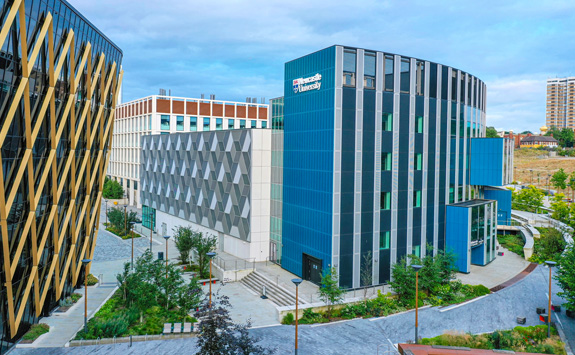Cities and Place
We are developing innovative solutions to expand social and economic opportunities, for a better quality of life for all.
Building sustainable communities
As our world’s population increases, our communities grow, develop, and change at pace.
This brings with it many challenges, from overcrowding and pressured infrastructures, to issues with resources and quality of living. The need to preserve green and natural spaces for the benefit of both communities and our environment is key in a world which is using resource so intensively.
The rising cost of living is a challenge for many, impacting on lifestyles and life expectancies within communities. Disparities between the better and the worse off continue to grow, bringing health and wellbeing issues as well as impacting on social and economic opportunities.
Maintenance of law and democracy continues to be a global issue. There is considerable concern around integrity of politics as well as full blown conflict situations.
The economic and social legacies of the past create a challenge for our communities of the future.
We are helping to build sustainable communities and living environments, for the benefit of all.
Interdisciplinary research: from founding to future
Our University was originally founded to educate pioneers of the industrial revolution and address social challenges like public health.
This founding ethos remains ingrained in our institution today. It influences both what we research and how we operate.
Embracing an interdisciplinary place-based approach, we collaborate with many partners to:
- understand and benefit society
- enhance the economic, health and cultural wellbeing of the places where we operate
- discover and share knowledge and practice to enable sustainable development around the world
We build impactful partnerships across business, education, government and communities.
Engagement and place
Our Engagement and Place Strategy focusses on improving the economy, health, social wellbeing and cultural richness of the places in which we operate.
Our engagement activities are wide ranging. We work closely with businesses, voluntary groups and the creative sector. We influence policy and are involved in public engagement in its many forms. Our student placements are across sectors, and across regions, countries, and nations.
At Newcastle University, we see the contribution we can make economically, socially and culturally as core to our purpose. We want to work with our staff, students and partners to maximise the positive impact we can achieve locally and globally.
Professor Jane Robinson
Pro-Vice Chancellor, Engagement and Place
Our partnerships
We work with partners to provide creative solutions to world-wide challenges. We’re committed to driving solutions to current and future challenges through collaboration. Our global partnerships deliver education, experiences and research that embrace a global outlook.
Proud of our regional roots, we are committed to making a positive impact in the North East of England. Our work with regional partners includes place-based policy making and research, creative practice and public engagement, and supporting business growth and innovation.
Farrell Centre
The Farrell Centre is our public centre for architecture and cities in Newcastle. Its mission is to widen the debate around the crucial roles that architecture and planning play in the contemporary world.
The centre opened in Spring 2023, and offers a variety of experiences for visitors of all ages with no admission fee.
Alongside temporary exhibitions, it contains three Urban Rooms exploring how architecture and planning have shaped the Newcastle and Tyneside of today and the roles they can play in reimagining it for tomorrow.
Learn more about the Farrell Centre and why we’ve created Urban Rooms for Newcastle.
Every city needs a place where people can come together to debate its future.
Sir Terry Farrell
Leading UK Architect-Planner, Newcastle University Alumnus
Education for life
Our University’s Education for Life strategy is vital. It aims to provide an engaging, challenging and supportive environment for our students. It helps them to discover and fulfil their potential. Our cities research influences various modules at undergraduate and postgraduate levels. Our Centre for Researching Cities helps students apply for funded PhD studies in cities-related topics.
We have an extensive programme of aspiration raising and support for students before, during and after their study with us. We have a longstanding commitment to widening participation and equality of opportunity in our region and across the UK.
View our collection of Architecture, Planning and Landscape teaching case studies.
Research infrastructure
Our research infrastructure includes institutes, groups, centres and facilities that enable interdisciplinary collaboration.
Research centres and academies
Many of our Centres of Research Excellence, academies and National Innovation Centres underpin our Cities and Place work:
- National Innovation Centre for Rural Enterprise
- Centre for Children and Youth
- Centre for Researching Cities
- Centre for Data
- Centre for Energy
- Centre for Heritage
- Global Challenges Academy
- Centre for Urban and Regional Development Studies
- Hub for Biotechnology in the Built Environment
Facilities
Our Urban Sciences Building is a living laboratory, bringing together cutting-edge research in computing, energy, water, digital urban sensing and infrastructure. It is home to the Newcastle Urban Observatory, the largest set of publicly available real time urban data in the UK, Smart Grid laboratory and the National Green Infrastructure Facility.
We host a number of the state-of-the-art facilities that the Hub for Biotechnology in the Built Environment is organised around. This includes a novel wet fabrication space that is one of the first in the world in this discipline.
Doctoral Training Centres
Our Doctoral Training Centres are developing future research leaders to make change possible. We help students apply for funded PhD studies in cities-related topics. We work closely with:
- Geospatial Systems Centre for Doctoral Training
- Northern Ireland and North East Doctoral Training Partnership
- Digital Civics Centre for Doctoral Training
Creative practice and public engagement
At our Newcastle city-centre campus we undertake creative practice and public engagement through:
Meet some of our researchers and innovators
- Professor Jane Robinson, Pro-Vice-Chancellor, Engagement and Place
- Professor Simin Davoudi, Professor of Town Planning
- Professor Andy Pike, Sir Henry Daysh Chair of Regional Development Studies
- Professor Danny MacKinnon, Professor of Regional Development and Governance; Director, Centre of Urban and Regional Development Studies, Co-Director, Centre for Researching Cities
- Professor Phil James, Professor of Urban Data, Co-Director, Centre for Researching Cities
- Professor Rose Gilroy, Professor of Ageing, Policy and Planning
- Professor Phil Blythe, Professor of Intelligent Transport Systems
- Professor Vee Pollock, Professor of Art and Place, Dean of Culture and Creative Arts
- Professor Andy Large, Professor in River Science
- Owen Hopkins, Farrell Centre Director
- Professor Ben Bridgens, Professor of Regenerative Architecture, Co-Director, Hub for Biotechnology in the Built Environment
- Dr Fiona Whitehurst, Associate Dean of Engagement and Place, Newcastle University Business School
- Professor Stuart Dawley, Chair in Economic Geography
- Professor Stuart Barr, Professor of Geospatial Systems Engineering
- Dr Abigail Schoneboom, Lecturer in Urban Planning; Degree Programme Director Geography and Planning
- Dr Matt Davies, Reader in International Political Economy
- Dr Andrew Walton, Senior Lecturer in Political Philosophy
Who we work with
We work and partner with a range of organisations including:
- Collaborative Newcastle which brings us together with NHS partners, local government, Northumbria University and the voluntary and community sector in Newcastle
- Newcastle Health Innovation Partners which brings together world-class research, education and clinical practice for the benefits of the region
- Legal & General Investment who are partners with us on the Newcastle Helix project
- founding member of UK Collaboratorium for Research on Infrastructure and Cities (UKCRIC)
- global place-based partnership with the University of Pittsburgh


